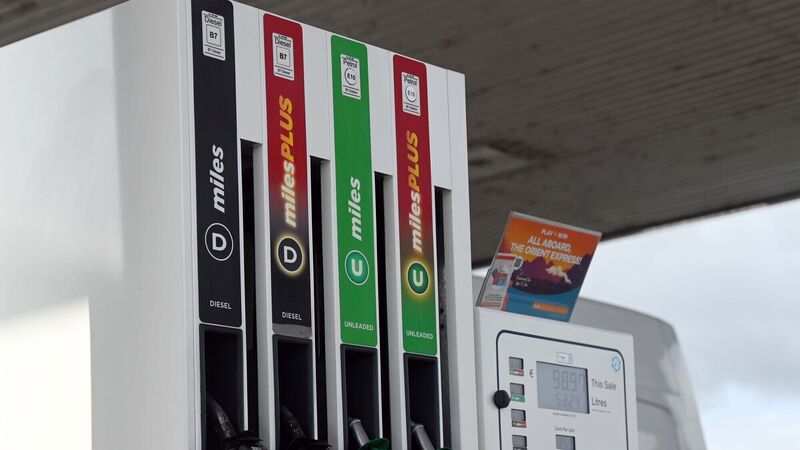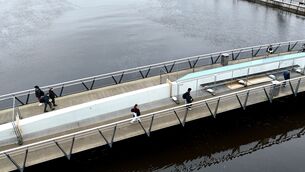Everything you need to know ahead of today's Budget

A proposal, which would gladden the heart of motorists, alarmed by the price of petrol and diesel’s return to the eye-watering highs of last Christmas, when they stood at €2 plus per litre, is the strongly rumoured suggestion that the last stage of the restoration of the Excise duty on fuel will be delayed beyond November 1.
THE budget has always been a big day on the Irish political calendar but the Government will have an eye on another impending big day in the political calendar, election day, when this year’s announcement will be made.
Ministers have been in intense discussions with the omnipotent Departments of Finance and Public Expenditure and Reform over the past few months in order to ensure they get the necessary funding to implement their agenda over the next year.
While there may be another budget day before the next general election, expected in late 2024 or early 2025, the reality is that measures announced on that budget day will be unlikely to be implemented in time for the electorate to take it into account before they cast their votes.
So a package of budget measures which has an appreciable positive impact on the lives and bank balances of those most likely to vote is vital today.
It will be vital for those struggling to make ends meet in a climate of rising fuel prices, the rapidly increasing cost of filling our shopping baskets, heating homes, getting to work, hikes in rent and mortgages, health insurance increases. For many the rising cost of living is making them make a difficult choice — between eating or heating.
But it will be the difference between continued political survival and electoral death for many serving TDs. And while that may not be the concern of the general public, it is definitely foremost in the minds of our elected politicians. Budget 2024 is the last chance saloon for the three party coalition government to set out its stall before the next election in the hope that sufficient numbers of voters will be happy — or content at least — to return them to power when the general election is called eventually, a tall order when the current opinion polls are considered.
Earlier this year, there was a suggestion that there would be a record budget surplus of €10 billion and this fuelled expectations that Finance Minister Michael McGrath and his Public Expenditure counterpart, Paschal Donohue, would be in generous mood.
Economists have predicted that between now and 2027, Ireland’s accumulated budget surplus will be €65 billion— so plenty of cash splashing around now and for the foreseeable future.
But efforts have been made to dampen these expectations over the past few weeks with a Budget package of €6.4 billion being mooted, a package of measures which is slightly less than the provisions in last year’s budget which amounted to €6.7 billion.
Plenty of kites have been flown about different possibilities of what might be included in today’s announcements, some of them have been leaked in order to test the reaction, others are genuine contenders, others are in the air in order to reduce the sense of anticipation among the public as to possible giveaways.
COST OF LIVING
A package of measures with a focus on cost of living will be among the headline grabbers of the budget and the Governments will be praying that it is for good reasons.
While it’s not likely that it will be on a par with last year’s package, when measures valued at €4billion were announced to help people deal with rising costs, it has to be significant enough to make an impact on families as they seek to balance their household budgets.
Among the items which are locked in for an increase is the pension — one reason being that old age pensioners are among the most vulnerable in society and most deserving of support. Another more compelling reason is that OAPs are among the most likely to vote and will remember who wronged them — and who supported them — when in the polling booths.
While an increase of €25 per week in welfare payments has been sought by some organisations — the likelihood is that the increase in these payments will be in the order of €10-15 in weekly allowances, perhaps a repeat of the €12 increase in payments last year is on the cards.
What can be almost certainly assured, however, is that there will be a double benefit payment at Christmas. This used to be locked in previously but after austerity hit, the festive bonus became less of a guarantee than an aspiration.
Energy tax credits are also on the cards. The suggestions are that these will be less than the three payments of €200 each which were pledged in last year’s budget and subsequently delivered. What is being mooted is two payments of €150 or three of €100.
Another proposal, which would gladden the heart of motorists, alarmed by the price of petrol and diesel’s return to the eye-watering highs of last Christmas, when they stood at €2 plus per litre, is the strongly rumoured suggestion that the last stage of the restoration of the Excise duty on fuel will be delayed beyond November 1.
This small mercy may yet be forestalled as it is unlikely to please the Green Party, who point out that fewer people on the road mean more likelihood we will not breach our emissions targets.
On the other hand, it may herald a win-win as last year’s pledge to extend the 20% reduction in public transport fares to the end of 2023 could be further extended to the end of next year. This would tally with the priorities of the Green Party to encourage greater use of public transport to help reduce emission levels.
Another cost of living relief being considered is a targeted mortgage relief for those hard pressed to meet their monthly payments, which have been increasing steadily in tandem with interest rate hikes from the European Central Bank. This is likely to be directed through the Department for Social Protection.
CHILDCARE
The demonstration outside the Dáil by childcare providers — and the disruption caused for parents by their three day strike — will have put that issue further up the priority list for the Government in the budget.
Last year, Minister for Children Roderic O’Gorman made a priority of seeking a 50% reduction in childcare costs to families. The first €25m of that pledge has been delivered at a cost estimated to be €121m — and now the question remains whether the second 25% will be delivered in full or substantial part.
Other proposals in the ether include a proposal to extend the Early Childhood Care and Education (ECCE) programme to disabled children with an additional proposal to target additional supports for children in disadvantaged areas.
The proposal made last year by Early Childhood Ireland that the Government sets out an ‘ambitious five year investment programme’ for the sector has not appeared among this year’s budget kites — but in light of recent protests, it could yet make an appearance on budget day. There will have to be some concession to the childcare providers to staunch the exit of creches and other childcare acilities from the sector and the ensuing chaos that would be caused if this exodus is not stopped in its tracks.
HEALTH
The Department of Health is by far the biggest spender in the Government and last year was no exception as the Cabinet was told last week that there had been a projected overspend of at least €1 billion.
This overspend is likely to impact on not only the health budget but also on all other departments. This is not likely to endear embattled Health Minister Stephen Donnelly to his colleagues who feel this is their last chance to make a positive impression before the impending election. They will be arguing that the allocations to their departments should not suffer because of the overspend in health — why should they have to suffer when they stayed within their budget allocations?
A likely impact in light of a statement by An Taoiseach last weekend is that moves to increase the provision of medical cards are unlikely to bear fruit.
Last year’s budget pledge to provide funding for one free round of fertility treatment, such as IVF, to qualifying couples came into effect last week.
While free contraception was provided to women aged 18-30 last year, the ambition to extend the upper limit of that group to women aged 35 may remain unfulfilled for this year.
A recruitment freeze is also likely as a consequence of the overspend as the HSE already has 142,000 employees. This is unwelcome news given the issues in many sectors, particularly in the mental health sector, but in light of the dire warning from the Irish Nurses and Midwives Organisation (INMO) that recruitment is being hit because of the lack of availability of affordable housing.
HOUSING
Providing housing in the form of new homes and refurbished vacant buildings, has to be a political priority for Budget 2024 given the rapid escalation of the numbers of homeless people at the end of the eviction ban last March.
An increase in the renters’ tax credit from €500 to €800, which is what’s being proposed by Housing Minister Darragh O’Brien is on the cards though it could go as high as €1000, as demanded by Higher Education Minister Simon Harris.
EDUCATION
Education Minister Norma Foley will be keen to expand the recruitment of teachers both at primary and secondary levels. Many schools are facing massive difficulties in recruiting teachers as better pay and tax packages, coupled with the availability of accommodation, are enticing teachers trained to a high level in Ireland to travel abroad to countries such as Saudi Arabia where they are in high demand.
Another possibility for the education budget, which could go towards helping families dealing with cost of living increases, is the extension of the free school books scheme from primary to secondary level.
TAX
The ‘squeezed middle’ is a phrase which becomes over-used at this time of year as the Government seeks to appease the middle income earners — those on salaries around the industrial average, approximately €45,000 — who will be expecting some relief.
The usual recourse of extending the tax bands to increase the threshold for incomes to be subject to the higher 40% tax rate is likely to be relied on again this year to grant a measure of relief to the squeezed middle.
Another proposal on the table is a reduction in the Universal Social Charge, the tax on all income which was introduced during the Austerity era to make sure we all paid for the losses of the banks embroiled in the crisis surrounding bad loans and dodgy mortgage decisions.
While a reduction in the USC is probable if not definite, a possible increase in Pay Related Social Insurance (PRSI) is being mooted and while this is unpalatable in political terms, the silver lining on that particular cloud is the suggestion from Heather Humphreys, Minister for Social Protection, that those on higher salaries could get proportionately higher social welfare payments if they become unemployed for one reason or another. The calculation is that, at a time of full employment to all intents and purposes, this might not be such a drain on resources as it might have been in the past.
THE BOTTOM LINE
Expect an increase to your weekly pay packet, thanks to tax adjustments, but don’t book a sun holiday on the strength of it. What the Government gives with one hand is likely to be taken away with another. Fuel prices will continue to increase and the only comfort will be that if you can avail of public transport, it will be cheaper.
The budget is unlikely to impact positively in the major indicators of progress — housing the homeless, healing the sick, or banishing child poverty.
The bottom line for the Government includes all of the above, but also includes the unwritten question, will it be enough to stave off electoral defeat?
The jury is out on that.










 App?
App?


